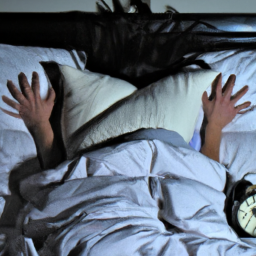I’ve always prioritized getting a good night’s sleep. However, lately, I’ve been experiencing vivid dreams that leave me feeling anxious and uneasy.
It’s not just one dream, but a recurring pattern that has left me wondering why I keep having these dreams and what I can do about them.
After doing some research and speaking with professionals, I have learned that there are a variety of reasons why someone may experience violent dreams. From stress and anxiety to trauma and sleep disorders, there are numerous factors that can impact the content of our dreams.
In this article, we will explore some of the common reasons why people experience violent dreams, what they may mean, and what steps we can take to address them.
Key Takeaways
- Violent dreams can be caused by stress, trauma, childhood experiences, and medications/drugs.
- These dreams can disrupt sleep and may indicate underlying psychological issues.
- Coping mechanisms include relaxation techniques, therapy, and self-care activities.
- Lucid dreaming can be a technique for controlling dreams, but it also has risks and requires mindfulness practices and journaling. Professional help is also available for analyzing dreams and managing them for overall well-being.
Definition of Violent Dreams
Violent dreams, or nightmares that involve physical aggression, are a common experience for many people. These dreams can take on a variety of forms, from being attacked by an unknown assailant to witnessing a violent act. While these dreams can be unsettling and may leave you feeling anxious upon waking up, they’re not always a cause for concern.
Causes of violent dreams can vary from person to person. Often, they’re the result of stress and anxiety, which can manifest in our dreams as physical violence. Other times, they may be related to past traumatic experiences or unresolved emotional issues. Interpretation of violent dreams can also be subjective, as each person’s subconscious is unique.
However, it’s important to pay attention to the themes and patterns that emerge in these dreams, as they may be indicative of underlying psychological issues that need to be addressed. Moving on to the next section, stress and anxiety can play a significant role in the frequency and intensity of violent dreams.
Stress and Anxiety
Feeling stressed or anxious can trigger intense and unsettling nighttime experiences. The mind is constantly processing information throughout the day, and if it isn’t given a chance to relax, it can manifest into vivid and violent dreams.
Stress and anxiety can also cause physical symptoms such as rapid heartbeat and sweating, which can further contribute to the intensity of dreams. To combat these intense dreams, relaxation techniques and mindfulness practices can be helpful.
Engaging in activities such as yoga, meditation, or deep breathing exercises can help calm the mind and body, allowing for a more restful sleep. It’s also important to establish a consistent sleep routine and limit screen time before bed, as these habits can disrupt sleep patterns and increase stress levels.
It’s important to note that these relaxation techniques may not be enough for those who have experienced traumatic events. In these cases, seeking professional help and therapy may be necessary to address the underlying causes of the violent dreams.
Trauma and PTSD
As someone who’s experienced trauma in my life, I know firsthand the impact it can have on my dreams.
It’s important to understand the different types of trauma, such as physical, emotional, and sexual, and how they can affect our subconscious mind.
Coping mechanisms for trauma and PTSD are crucial for managing the effects of these experiences on our mental health. These can include therapy, mindfulness practices, and self-care strategies.
By exploring these topics, we can gain a better understanding of how trauma can affect our dreams and develop effective ways to cope.
Types of Trauma
Experiencing different types of trauma can have a significant impact on the content of one’s dreams. This is because the subconscious mind processes and stores traumatic events differently from other memories. Here are three types of trauma that can affect the content of one’s dreams:
-
Sexual Trauma: People who’ve experienced sexual trauma may have nightmares about rape, molestation, or sexual abuse. These dreams may be vivid, graphic, and emotionally intense. Trauma-Informed Therapy can help survivors process their experiences and reduce the frequency and intensity of these dreams.
-
Physical Trauma: Individuals who’ve suffered physical trauma may have dreams about accidents, injuries, or violence. These dreams may be accompanied by feelings of fear, helplessness, or anxiety. Healing from trauma can involve addressing the physical and emotional aspects of the experience to reduce the impact of these dreams.
-
Emotional Trauma: People who’ve experienced emotional trauma, such as neglect, abandonment, or betrayal, may have dreams about rejection, loss, or abandonment. These dreams may trigger feelings of sadness, anger, or fear. Trauma-Informed Therapy can help individuals process their emotions and develop coping mechanisms to reduce the frequency and intensity of these dreams.
Understanding the types of trauma that can affect our dreams is an important step in addressing the impact of trauma on our psyche. In the next section, we’ll explore how trauma affects our dreams in more detail.
How Trauma Affects Our Dreams
Imagine you’re watching a movie where the main character is constantly running from a terrifying monster, only to wake up and realize that the monster was a representation of the trauma you experienced, affecting your dreams in a way that can leave you feeling anxious, scared, and overwhelmed.
Trauma can have a significant impact on our dreams, especially when it comes to violent dreams. Childhood experiences, in particular, can shape our dreams and nightmares, as they often leave a lasting impression on our subconscious. These experiences can include physical, emotional, or sexual abuse, neglect, or witnessing violence.
Therapy can be a crucial tool for addressing traumatic dreams, as it can help individuals process their experiences and work through the emotions and memories that may be causing these dreams. Through therapy, individuals can learn coping mechanisms to manage the anxiety and fear that may arise from violent dreams.
This can include techniques such as mindfulness, relaxation exercises, and cognitive-behavioral therapy. By addressing the root cause of the dreams, individuals can find relief and begin to experience better sleep and reduced anxiety.
As we explore coping mechanisms for trauma and PTSD, we’ll delve deeper into these techniques and how they can help individuals manage their symptoms.
Coping Mechanisms for Trauma and PTSD
Coping with trauma and PTSD can be challenging, but there are effective techniques to manage symptoms and improve quality of life. One helpful technique is mindfulness practices, which involve focusing on the present moment and being aware of one’s thoughts and feelings without judgment. This can help reduce anxiety and stress, as well as improve overall mental health.
Therapy techniques such as cognitive-behavioral therapy (CBT) and eye movement desensitization and reprocessing (EMDR) are also effective in treating trauma and PTSD. CBT helps individuals identify and change negative thought patterns, while EMDR focuses on processing traumatic memories in a safe and controlled environment.
Another important coping mechanism is seeking support from others. Support groups provide a safe space for individuals to share their experiences and connect with others who have gone through similar situations. Additionally, self-care activities such as exercise, meditation, and relaxation techniques can help reduce stress and improve overall well-being.
It’s important to remember that coping with trauma and PTSD is a journey, and it may take time to find the right combination of techniques and support. However, with patience and persistence, it’s possible to improve one’s quality of life and manage symptoms.
Transitioning into the subsequent section about sleep disorders, it’s important to note that coping techniques for trauma and PTSD can also have a positive impact on sleep. Mindfulness practices and relaxation techniques can help calm the mind and promote restful sleep. Additionally, therapy techniques such as CBT can help individuals address sleep disturbances and improve sleep quality.
Sleep Disorders
You may be struggling with a sleep disorder if you frequently have violent dreams, which can be disruptive to your overall sleep quality and leave you feeling exhausted during the day. Sleep disorders can take many forms, including insomnia, sleep apnea, restless leg syndrome, and narcolepsy. These conditions can make it difficult to fall asleep, stay asleep, or achieve restful sleep, which can have serious consequences for your physical and mental health.
To improve your sleep hygiene and reduce the frequency of violent dreams, it’s important to establish a consistent sleep schedule, avoid caffeine and alcohol before bed, and practice relaxation techniques such as deep breathing, meditation, or yoga. Creating a relaxing sleep environment with comfortable bedding, a cool temperature, and minimal noise and light can also promote better sleep quality. However, if these strategies are not effective, it may be necessary to seek medical treatment, such as medication or therapy, to address underlying sleep disorders. In the next section, we will explore the use of medications and drugs in treating sleep disorders.
Medications and Drugs
I’ve often wondered how my medications and recreational drug use might be affecting my dreams.
After some research, I found out that certain common medications can indeed have an impact on the content and vividness of dreams.
Additionally, recreational drugs such as marijuana and LSD can also have profound effects on the dreaming experience.
Despite these potential negative effects, there are coping mechanisms and strategies available for those who may be experiencing unsettling or disturbing dreams due to medications or drug use.
Common Medications that Affect Dreams
If you’re taking certain medications, like antidepressants or blood pressure meds, they can cause vivid and sometimes violent dreams, which can be like watching a horror movie every night.
Here are some common medications that may affect your dreams:
-
Antidepressants: These meds are often prescribed to help manage depression and anxiety. However, some of them can cause vivid and violent dreams as a side effect. If you’re experiencing this, talk to your doctor about switching to a different medication that may not have this side effect.
-
Blood pressure medications: Certain blood pressure meds, such as beta blockers, can also affect your dreams. These meds work by slowing down your heart rate and can cause vivid and sometimes violent dreams. If you’re experiencing this, talk to your doctor about adjusting your dosage or switching to a different medication.
-
Allergy medications: Some allergy meds, such as Benadryl, can cause drowsiness and affect your dreams. While not necessarily violent, they can make your dreams more vivid and strange.
-
Pain medications: Certain pain meds, such as opioids, can also affect your dreams. They work by blocking pain receptors in the brain, but can also affect your dreams and make them more vivid.
Recreational drugs can also affect your dreams, often in more intense and unpredictable ways.
Recreational Drugs and Their Effects on Dreams
Recreational drugs, such as marijuana and LSD, can impact mental health and alter the content and intensity of dreams. These substances can affect sleep hygiene practices, making it difficult to achieve a restful night’s sleep.
Dream interpretation and analysis may also become more challenging due to the distorted and surreal nature of these altered dreams. For those who use recreational drugs, it may be helpful to incorporate dream journaling and analysis into their sleep hygiene routine.
This practice can help individuals better understand the impact of drug usage on their dreams and overall mental health. Coping mechanisms for medications and drugs can also be explored to manage the effects of altered dreams and promote healthy sleep patterns.
Coping Mechanisms for Medications and Drugs
Just like Odysseus used a piece of rope to navigate the treacherous waters of Scylla and Charybdis, individuals can use coping mechanisms such as cognitive-behavioral therapy or mindfulness meditation to manage the effects of medications and drugs on their dreams and promote a restful night’s sleep.
Mindfulness exercises, for example, can help individuals become more aware of their thoughts and feelings, allowing them to identify triggers that may lead to violent dreams. They can then use this awareness to develop coping strategies to manage these triggers and reduce the frequency of violent dreams.
Therapy sessions with a trained professional can also be helpful in managing the effects of medications and drugs on dreams. A therapist can work with individuals to identify the underlying causes of their violent dreams, such as past trauma or anxiety, and develop strategies to address these issues. This may include techniques such as exposure therapy or cognitive restructuring, which can help individuals reframe their thoughts and feelings about past experiences and reduce their impact on their dreams.
By incorporating these coping mechanisms, individuals can take control of their dreams and promote a more restful night’s sleep.
Now, let’s explore how diet and lifestyle can also play a role in managing violent dreams.
Diet and Lifestyle
Maintaining a balanced diet and active lifestyle can have a significant impact on the frequency and intensity of violent dreams. It’s important to pay attention to what we eat and when we eat it. Consuming heavy meals or stimulants before bedtime can lead to restless sleep and vivid dreams. It’s recommended to eat a light dinner at least two hours before bedtime and avoid caffeine, alcohol, and nicotine.
Exercise habits also play a crucial role in managing violent dreams. Regular physical activity not only improves overall health but also promotes better sleep quality. It’s recommended to engage in at least 30 minutes of moderate-intensity exercise every day, such as brisk walking, jogging, or swimming. Additionally, practicing relaxation techniques such as meditation or deep breathing before bedtime can help calm the mind and reduce stress levels.
By adopting healthy eating and exercise habits, we can improve our sleep quality and reduce the occurrence of violent dreams.
Transitioning into the subsequent section about symbolism in dreams, it’s important to note that while lifestyle changes can have a significant impact on the frequency and intensity of violent dreams, they don’t always eliminate the underlying psychological issues that may be causing them.
Understanding the symbolism in our dreams can provide valuable insight into our unconscious thoughts and emotions, allowing us to address and resolve any underlying issues that may be contributing to our violent dreams.
Symbolism in Dreams
Exploring the symbolism in your dreams can provide a deeper understanding of your subconscious thoughts and emotions, allowing you to uncover the root causes of your vivid and potentially disturbing nighttime experiences. Dream interpretation has a long history and is often used as a tool for psychological analysis. By analyzing the symbols and themes present in your dreams, you can gain insight into your fears, desires, and unresolved conflicts.
To help you better understand how symbolism works in dreams, let’s take a look at a simple example. Imagine you’re walking through a forest in your dream and you come across a snake. In the table below, we can see how different elements of this dream can be interpreted symbolically:
| Dream element | Symbolic interpretation |
|---|---|
| Forest | Unconscious mind |
| Snake | Fear, danger, transformation |
From this analysis, we can infer that the dreamer may be struggling with some unconscious fears or emotional transformation. By exploring the symbolism in your dreams in this way, you can gain a deeper understanding of your subconscious and work towards resolving any underlying issues that may be causing your violent dreams.
Now, let’s move on to the next section where we’ll discuss how lucid dreaming can help you take control of your dreams and potentially reduce the frequency of violent or disturbing experiences.
Lucid Dreaming
I’ve always been fascinated by the idea of controlling my dreams, and that’s where lucid dreaming comes in. Basically, lucid dreaming is the ability to become aware that you’re dreaming, which gives you the power to manipulate and control your dream.
There are many techniques out there for lucid dreaming, such as reality checks and dream journaling, that can help you achieve this state. However, for some people, lucid dreaming can be overwhelming or even scary, so it’s important to have coping mechanisms in place if you experience any negative effects.
Definition of Lucid Dreaming
You can experience lucid dreaming, where you’re aware that you’re dreaming and can control the outcome of your dreams. Lucid dreaming can be a fascinating and rewarding experience. It allows you to explore the depths of your subconscious mind and overcome fears and anxieties. However, like any other activity, there are benefits and risks associated with lucid dreaming.
Exploring the benefits of lucid dreaming, it can help you overcome nightmares, improve your creativity and problem-solving skills, and even enhance your self-awareness and spiritual growth. On the other hand, the risks of lucid dreaming include sleep paralysis, false awakenings, and the possibility of becoming addicted to the dream world.
Therefore, it’s crucial to master techniques for lucid dreaming and exercise caution when exploring the dream world. In the next section, we’ll discuss some of these techniques and how to use them effectively.
Techniques for Lucid Dreaming
To experience lucid dreaming, there are several techniques that can be utilized. One such technique is meditation. Meditation can help to clear the mind and increase focus, which can be beneficial when attempting to enter a lucid dream state. By practicing meditation regularly, an individual can improve their ability to control their thoughts and emotions, which can ultimately lead to an increased ability to achieve lucid dreaming.
Another technique for achieving lucid dreaming is reality testing. This involves regularly checking to see if you’re dreaming or not throughout the day. By questioning your surroundings and performing reality checks, such as checking the time or looking at your hands, you can train your brain to recognize when you’re in a dream state. This increased awareness can then carry over into your dreams, allowing you to realize that you’re dreaming and take control of the experience.
Moving forward, it’s important to note that coping mechanisms for lucid dreaming are just as crucial as the techniques for achieving it. By learning how to manage the effects of lucid dreaming, individuals can better ensure a positive and restful sleep experience.
Coping Mechanisms for Lucid Dreaming
One interesting statistic is that up to 70% of people experience lucid dreaming at least once in their lifetime, making it important to have coping mechanisms in place. Coping mechanisms can help individuals deal with the potential negative side effects of lucid dreaming, such as feeling overwhelmed or experiencing anxiety.
Here are three coping mechanisms that can help:
-
Visualization exercises: One way to manage lucid dreaming is through visualization exercises. This technique involves imagining a calming and peaceful scene, such as a beach or forest. By focusing on this image, individuals can reduce anxiety and stress levels and promote relaxation.
-
Mindfulness practices: Another effective coping mechanism is practicing mindfulness. This involves being present in the moment and focusing on your breath or physical sensations. By practicing mindfulness, individuals can improve their ability to control their thoughts and emotions, which can help them manage the potentially overwhelming experience of lucid dreaming.
-
Journaling: Lastly, keeping a dream journal can help individuals process their lucid dreams and manage any negative emotions they may experience. Writing down the details of the dream can help release any pent-up emotions and provide insight into potential triggers for future lucid dreams.
It’s important to note that while these coping mechanisms can be helpful, some individuals may require additional support. Seeking professional help may be necessary for those experiencing severe anxiety or other mental health issues related to their lucid dreaming.
Seeking Professional Help
If you’re experiencing recurring violent dreams, it may be helpful to seek professional help from a therapist or counselor who specializes in dream analysis. These professionals can help you understand the underlying causes of your violent dreams and develop coping mechanisms to manage them. There are several therapy options available, including cognitive-behavioral therapy (CBT) and exposure therapy. CBT can help you identify negative thought patterns and replace them with more positive ones, while exposure therapy involves gradually exposing yourself to the situations or stimuli that trigger your violent dreams.
In addition to therapy options, there are also support groups available for individuals who experience violent dreams. These groups provide a safe and supportive environment where you can share your experiences and receive emotional support from others who understand what you’re going through. It’s important to remember that seeking professional help is a sign of strength, not weakness, and that there is no shame in asking for help when you need it. With the right support and guidance, you can learn to manage your violent dreams and improve your overall well-being.
Frequently Asked Questions
What is the difference between a nightmare and a violent dream?
What makes a violent dream different from a nightmare? Psychoanalyzing violent dreams can help us understand the subconscious mind behind nightmares and the possible underlying issues that need to be addressed.
Can violent dreams be a symptom of a serious medical condition?
Violent dreams can be a symptom of underlying medical conditions such as PTSD, depression, or anxiety. Medical treatment and counseling options are available to address these issues and help alleviate the frequency of violent dreams.
Is there any way to prevent violent dreams from occurring?
I’ve found that practicing meditation techniques and undergoing cognitive behavioral therapy have helped me prevent violent dreams. These methods have allowed me to gain better control of my thoughts and emotions, leading to a more peaceful sleep.
How do violent dreams affect a person’s mental health in the long term?
Identifying triggers and seeking professional help can aid in preventing long-term negative effects of violent dreams on mental health. It’s important to address these dreams as they can lead to anxiety, depression, and PTSD-like symptoms.
Are there any specific triggers for violent dreams, or do they occur randomly?
Trauma induced triggers and psychological factors can lead to violent dreams. Like a storm brewing in the distance, these triggers can build until they manifest in vivid and unsettling dreams.
Conclusion
In conclusion, after exploring various factors that could contribute to violent dreams, it’s clear that they can be a result of stress, anxiety, trauma, sleep disorders, medications, and even diet and lifestyle.
However, it’s essential to note that our dreams can also have symbolic meanings, and the interpretation of these symbols can vary among individuals.
Furthermore, it’s not uncommon for people to experience lucid dreams, where they have control over their dreams. Seeking professional help from therapists or sleep specialists can offer solutions, such as therapy, medication, or lifestyle changes, to improve the quality of sleep and reduce the likelihood of having violent dreams.
As the saying goes, "life is but a dream,"and understanding our dreams can lead to a better understanding of ourselves and our subconscious minds.









